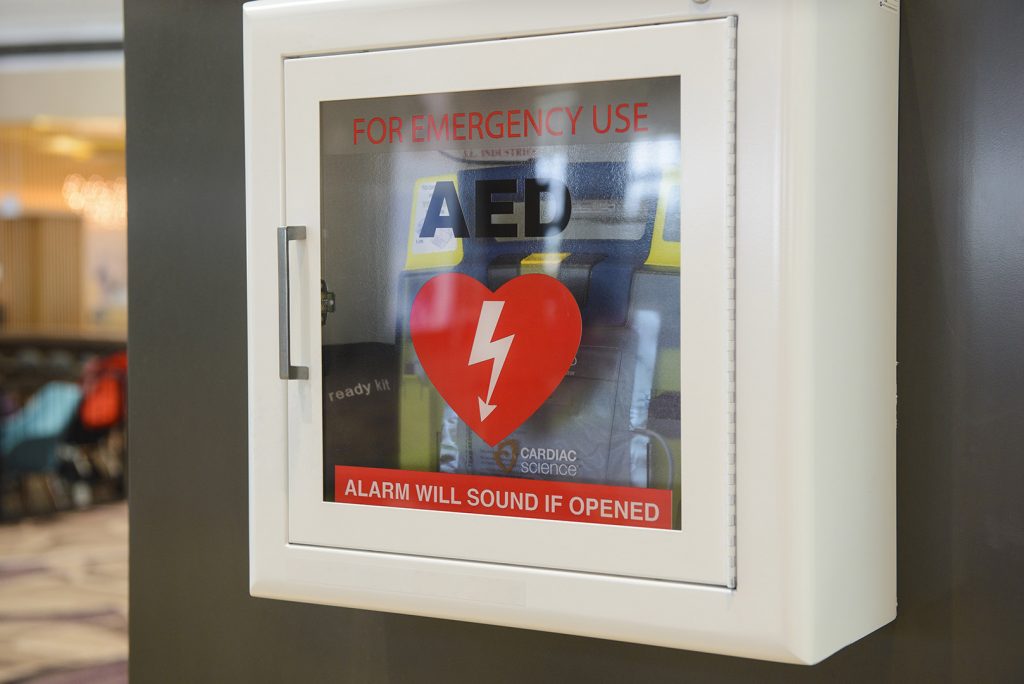California Court Rules YMCA Not Required to Provide AEDs to Parties Who Lease Facilities
 By Lynn Fugaro Leave a Comment
By Lynn Fugaro Leave a Comment
Automated external defibrillators (AEDs) save lives. That is not in dispute.
Under California law, every “health studio” has a duty to provide and maintain AEDs on site. What was in dispute recently before the California Court of Appeals was whether a “health studio” breached that duty when the member of a third party league suffered cardiac arrest while using the YMCA’s athletic field and no AED was provided.
California law defines “health studio” as follows:
For purposes of this section, “health studio” means a facility permitting the use of its facilities and equipment or access to its facilities and equipment, to individuals or groups for physical exercise, body building, reducing, figure development, fitness training, or any other similar purpose, on a membership basis.
Jabo v. YMCA of San Diego Co.
The Chaldean Soccer League in San Diego contracted with the YMCA of San Diego County to lease their soccer fields for the season. The soccer league paid $2,550 for the use of the fields, and the YMCA agreed to not only let the league use their fields, but to also provide a scoreboard and a scorekeeper. Adeal Jabo was a 43-year-old member of the Chaldean Soccer League who walked off the field, suffered massive cardiac arrest, and later died after arriving at the hospital.
Kamal Sadiq was also a member of the Chaldean Soccer League and a part-time employee of the YMCA who was keeping score that night. Kamal had left the field to use the restroom when Jabo suffered his heart attack, but upon return Kamal aided in providing CPR and calling 911. Jabo’s family filed a wrongful death lawsuit against the YMCA alleging that they were required to provide an AED for the soccer game and failed to do so, which contributed to Jabo’s death.
Although the YMCA did have AEDs on site, it filed a motion for summary judgment alleging that regarding the Chaldean Soccer League, it was not considered a health studio and had no duty to provide an AED for the soccer match. The trial court agreed with the YMCA and dismissed the case. Jabo’s family then filed appeal, which sent the case to the California Court of Appeals.
The trial court’s decision really rested on two words: “membership basis.” The Chaldean Soccer League had no member relationship with the YMCA. It was a third party who leased the use of the fields from the YMCA and nothing more. Therefore, the trial court ruled that the YMCA did not have a duty to provide an AED as the soccer league was not a member of the YMCA, but simply a lessor.
The California Court of Appeals ultimately agreed with the YMCA and the trial court, agreeing that since the relationship between the soccer league and the YMCA was a nonmember relationship, the YMCA did not have a duty to provide an AED and was not culpable in Jabo’s death.
Health facilities like hospitals and nursing homes have a clear duty to have AEDs readily available to all of their staff and patients, but health studios are less easily defined, as shown in this case. Where a hospital has the same relationship with all of its patients, health studios may or may not always serve as health studios. For example, hotels that provide fitness facilities are not subject to the California law and do not have to provide AEDs. The confusion is understandable, but the Court of Appeal’s ruling in this case makes it clear that unless you have a clear membership relationship with a health studio, it is not required to provide you an AED.
California Court Rules YMCA Not Required to Provide AEDs to Parties Who Lease Facilities
